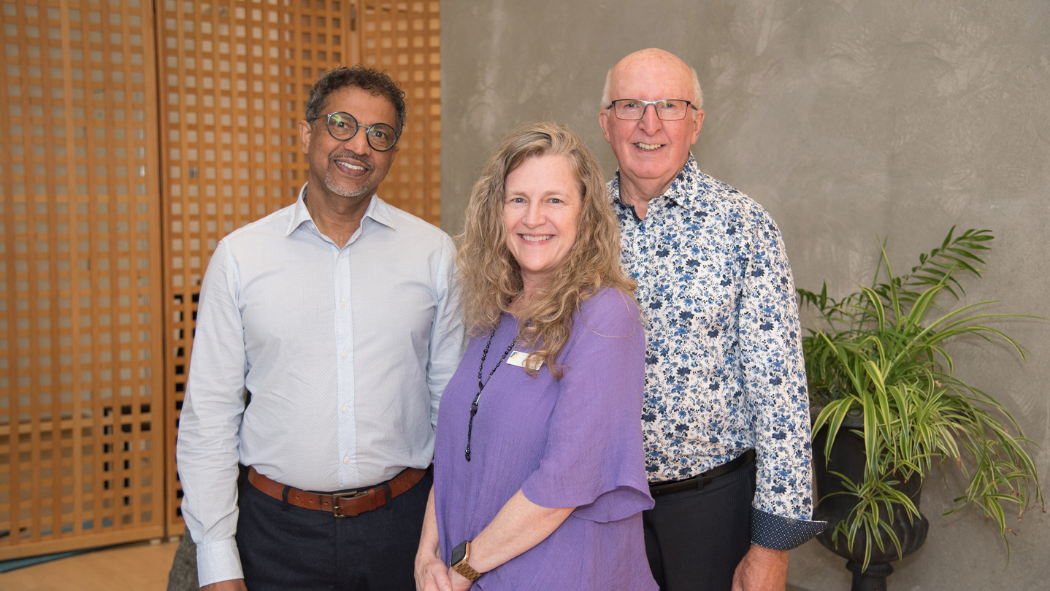
From left: Johnson Kuriappilly, BJ Dunbar and Darrell Shaule, Spiritual Care Practitioners at LHSC
August 29, 2023
Spiritual Care Practitioners on the Spiritual Care team at London Health Sciences Centre (LHSC) are integral members of interdisciplinary care teams. Spiritual care is an important part of people-centred, holistic care.
The spiritual care practitioner’s focus is on people’s spiritual health – their values, and where they find meaning and purpose.
“Spiritual Care helps the patient look beyond their diagnosis and what they’re going through,” Johnson Kuriappilly, Spiritual Care Practitioner, explains. “The way a person looks at their life, their spouse, their children, their grandchildren – it often shifts when you receive a life changing diagnosis or when you know you are going to die.”
What is spiritual care?
Spiritual care is not connected to any specific religion or denomination. If you don’t belong to any faith/spiritual group or organized religion, spiritual care practitioners are still there to support you when you need to talk about the meaning of your life, existential struggle you are going though or your life experiences or have to make a difficult decision and find one aligned with your values and outlook on your life.
Spiritual care practitioners at LHSC support all – patients and staff, family members and caregivers – regardless of religious or non-religious affiliation or faith background.
“As a society we are in such a multicultural space today with multiple faith backgrounds and belief systems, we, as spiritual care practitioners, don’t want to be put into a box,” Darrell Shaule, Spiritual Care Practitioner, LHSC, explains. “Some people might not know or understand what spiritual care is but we are here to support everyone.”
What is important in spiritual care practice?
“The most important element in speaking with people is not the tools a therapist or spiritual care practitioner brings, but the relationship built,” BJ Dunbar, Spiritual Care Practitioner, states. “Every spiritual care practitioner will have a different way of creating a therapeutic relationship. The biggest ‘tools’ we have are a result of our training in listening with compassion, curiosity, kindness and providing unconditional positive regard to help people feel connected to their sense of what is sacred.”
Spiritual care practitioners work to establish trust. “If a person doesn’t trust us, how are those deeper conversations going to happen? Kuriappilly questions. “We meet them at whatever point they may be in their life and enter into their life as strangers, but we journey with them as one who cares as they open up to share their story and happenings in their lives.”
LHSC is an organization that supports holistic healing and looks after more than just physical health, but also mental and spiritual health and wellbeing as well.
“We, as spiritual care practitioners, bring our humanity, our authentic self and try to be real with people,” Shaule explains. “We meet people at their point of need, whether they are struggling, in despair, are celebrating a life event, waiting for test results, struggling with meaning in life, in their relationships or struggling with a vision for the future.”
Who seeks out spiritual care?
LHSC’s spiritual care practitioners visit with a variety of staff, patients, family members and caregivers within the organization.
A person experiencing emotional distress, those with a new diagnosis that impacts their quality of life, or those who have challenging decisions to approach, such as the decision to move forward with MAiD (Medical Assistance in Dying), are often why spiritual care practitioners are sought out. Many others seek out spiritual care to support a celebration such as a wedding or birth.
Kuriappilly notes, “Spiritual care provides the support many are looking for through listening and providing wisdom in alignment with the person’s morals. We integrate different aspects of personality and ways of being and living.”
Sanctuary spaces
The sanctuary spaces provide a time for visitors to pause, think, reflect or pray in whatever way visitors want to do that.
There are sanctuary spaces available for use by anyone – staff, patients, family members, caregivers – at University Hospital (Lobby, A1-502) and at Victoria Hospital (C3-402).
The sanctuary spaces are designated as places of safety and refuge. They are wheelchair accessible and can be accessed at any time for prayer, meditation and quiet reflection. There are kneeling cushions, prayer mats and space for yoga and meditation. Smudging ceremonies for Indigenous patients, led by an Indigenous healer, can be arranged as well.
The spaces are also used for events such as weddings and memorials.
“The sanctuaries are places of peace,” Dunbar says. “We hope they are effective at facilitating an opportunity to reflect on a person’s current place in their life journey and to consider what their spiritual needs are in the moment.”
Spiritual care practitioners at LHSC value patients as whole in body, mind and spirit, with highly individual stories. They attend to the emotional, relational and spiritual dynamics to the human experience of illness and disease. Caring for the human spirit helps people who are faced with distress of illness and grief to find comfort and meaning – whoever they are, wherever they are, whatever they believe.
